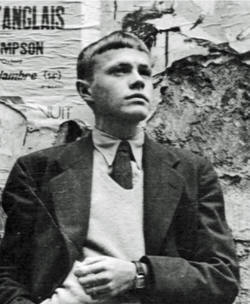

Queer Places:
1099 Merrill St, Winnetka, IL 60093
Yaddo, 312 Union Ave, Saratoga Springs, NY 12866
786 Geary St, San Francisco, CA 94109
 Ralph
Joseph Pomeroy (October 12, 1926 – November 18, 1999) was an American poet. Throughout his writing career he published essays, monographs, catalogs, three poetry collections and an illustrated book of poems with
Andy Warhol entitled "A La Recherche du Shoe Perdu". One of his books was about painter
Theodoros Stamos. His friend,
Edward Field, discusses his life in his book: The Man Who Would Marry Susan Sontag and Other Intimate Portraits of the Bohemian Era (2007).
Ralph
Joseph Pomeroy (October 12, 1926 – November 18, 1999) was an American poet. Throughout his writing career he published essays, monographs, catalogs, three poetry collections and an illustrated book of poems with
Andy Warhol entitled "A La Recherche du Shoe Perdu". One of his books was about painter
Theodoros Stamos. His friend,
Edward Field, discusses his life in his book: The Man Who Would Marry Susan Sontag and Other Intimate Portraits of the Bohemian Era (2007).
Ralph Joseph Pomeroy was born in Evanston, Illinois, and raised in Winnetka, Illinois. He attended the School of the Art Institute of Chicago and the University of Illinois. At eighteen he had already published poems in "Poetry", which was one of the leading poetry magazines in America at the time. He pursued painting in Paris, France, in the 1940s, and then worked as an editor, art critic, curator and exhibiting artist in New York City. In the 1950s he was active in San Francisco's poetry scene, although he was not a Beat poet.
In 1948, Ralph Pomeroy, with his sulky, petulant-lipped beauty and blond bangs, was known on the Left Bank of Paris as le faux Truman. The "real" Truman was Truman Capote, who had recently made a sensational debut with Other Voices, Other Rooms and its come-hither photo of the author on the back cover. Much better-looking than Capote, Ralph was what Capote should have looked like. Equally precocious, at eighteen he had already published poems in Poetry, at that time the absolute pinnacle of poetry magazines in America.
In an article for "The Gay & Lesbian Review," (2005), Edward Field remembered: I first noticed him--impossible not to, he radiated such golden youth, such fun--with Freddie Kuh, his childhood friend, in the mail line at American Express, both looking absurdly young in short pants--at most, I thought, fifteen and sixteen respectively. Ralph was from Evanston and Freddie from nearby Glencoe, I learned later, when I met them in the cafes of the Left Bank where the artsy youth of that era gravitated from all over the world-- with a large American contingent among the expatriates. Young Jimmy Baldwin was there, giving enraptured southern Americans their first taste, and a foretaste, of the pleasures of integration, and Gore Vidal, whose French boyfriend--the "Bicycle Boy" we called him--turned heads as he pedaled by the lively cafes clustered around the ancient, dignified church of St. Germain. Actually 22, Ralph was being subsidized by his businessman father for a year abroad, though--I didn't know it then--his free-spending style was helped along with contributions from older admirers. The paradox was that he was both a serious poet and a dedicated hustler who didn't mind being anybody's sex object. Paris after the war was our playground in a Europe that was in ruins. London was grim with rationing. Germany still shivered. Displaced Persons camps were full of the suffering flotsam of humanity. Nazi leaders were on trial. Boats of desperate concentration camp survivors were being sunk, trying to get into Palestine. But in Paris, in the final days of food rationing, we ate meals to die for, even if we suffered frequent coupures, when the electricity or water went off for hours. The French themselves went around sourly, in a rage against what they had gone through during the war and the Occupation, against the prices, the low wages, and, especially, against the rich "Amis" with their powerful dollar--the same dollar that actually bought me, incredible as it seems now, a year in Paris for a thousand dollars. But none of that bothered any of us young Americans, dazzled as we were by Paris and the intellectual excitement of Existentialism, or just being there in the red hot center of the moment.
Field notes that the openly gay Pomeroy was accepted by Yaddo 1955, "where he scandalized the sedate arts colony by having an open affair with painter Clifford Wright". Clifford Wright's open attitude about sex, perhaps informed by his Seattle artist friends, like Morris Graves, whose polyamorous nonconformity is well documented, led him to physical intimacy with both men and women. Some of his conquests, like poet Ralph Pomeroy, formed an emotional and sexual attachment to Wright, while others, like the British writer Marc Brandel, had kinky leanings that were not to Wright's tastes.
The New York Times published Pomeroy's poetry on five separate occasions in 1968 and 1969. He taught at the Academy of Art University in San Francisco in the late 1980s and 1990s. Many years later, he was stabbed in the chest by a "fag basher", and also suffered a broken wrist while engaged in what a friend described as "S&M games with a trick."
Pomeroy died of cirrhosis of the liver in San Francisco in the fall of 1999.
My published books: